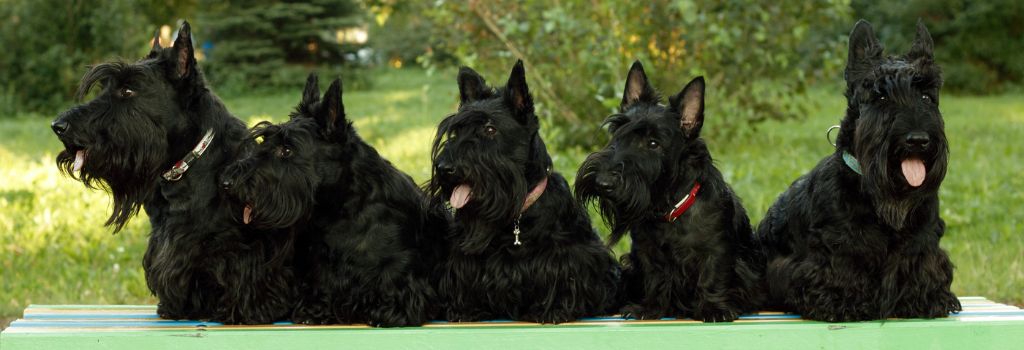If you've opened your home to a Scottish Terrier, commonly referred to as a Scottie, then you already know you're in for a vibrant life with a dog full of personality. From their robust build to their undeniable intelligence, Scotties make wonderful companions for the right owners. Here's everything you need to know about your unique furry friend.
Why We Love Scotties:
- A Confident Canine: Scotties are known for their self-reliance and confidence, making them highly intelligent and eager to explore the world around them. They're energetic and playful, always ready for an exciting game of fetch or a stimulating puzzle toy.
- A Watchdog at Heart: With their loud bark and alert nature, Scottish Terriers excel as watchdogs. They're ever vigilant, keen to protect their home and their loved ones from anything they deem suspicious.
- Devotedly Yours: Scotties are incredibly loyal, forming a strong bond with their human companions. This loyalty often translates into an enduring affection for their owners, making them excellent pets for those looking for a devoted friend.
- Agile and Athletic: Despite their small size, Scottish Terriers are muscular and agile, always ready for an adventure or a spirited game. This agility makes them perfect for those who appreciate a more active canine companion.

Navigating the Challenges
Scotties are not without their challenges. They respond poorly to harsh training methods and are better suited to positive reinforcement techniques. Their inquisitive nature and strong prey drive make them prone to chasing smaller animals, and they can be wary of strangers. Digging is a favorite pastime, and their independent nature means they often have a mind of their own.
A Historic Lineage
Originally bred in Scotland for vermin control and hunting, Scotties have a rich history. They gained international prominence in the late 19th century and have the unique distinction of being the chosen breed of three U.S. Presidents. While their feisty nature may make them less suitable for homes with small children or other pets, their loyalty and intelligence make them a cherished member of many households.
Health and Longevity
Scottish Terriers are generally robust dogs with a lifespan of 12-15 years. While they're a hearty breed, like all dogs, they have their specific health concerns, so regular vet check-ups are crucial.
So, is a Scottish Terrier the right dog for you? If you're looking for a spirited, intelligent, and intensely loyal companion—and you're prepared to meet her needs for mental and physical stimulation—then the answer is a resounding yes. With the right care and training, your Scottie will be a cherished member of your family for years to come.

Genetic Predispositions for Scottish Terriers
Cushing’s Disease: What You Need to Know for Your Diehard Doggo
If your fur baby seems to be more sluggish, drinks water like it's going out of style, and has a sudden appetite that could rival a teenage boy, don't dismiss these signs! They could point to a common issue in dogs, especially among Diehards—cushings disease. This condition affects the adrenal glands, making them produce an excess of steroid hormone. It's a slow creeper, so it's easy to miss the early symptoms. As it progresses, you may notice your pup developing a potbelly and thinning skin. Treatment usually consists of oral medications, so you'll want to be in close coordination with your vet for the perfect dosage. Early detection and treatment can go a long way!
Eye Care: A Sight for Scottish Terriers
When it comes to a dog's well-being, their eyes play a starring role. Sadly, Scottish Terriers are susceptible to various eye issues that could lead to blindness or be downright painful. Cataracts, for instance, can cloud the eyes and cause blindness over time, but many dogs adapt well, and there are surgical options to restore vision. Another condition, Distichiasis, features extra hairs growing inside the eyelid, leading to chronic eye pain. It sounds like an annoying eyelash, but way worse! Then, there’s Persistent Pupillary Membrane, which isn't usually a big problem but can be if unlucky. Regular eye checks will help to catch and treat these issues before they get out of paw.
Von Willebrand's Disease: The Bleeding Disorder Scottish Terriers Face
Blood clotting disorders are particularly challenging because they often go unnoticed until a crisis occurs—like surgery or severe injury. Scottish Terriers are more likely than most dogs to inherit Von Willebrand's Disease, which affects blood clotting. To be on the safe side, vets usually conduct specific DNA blood tests before any surgical procedures. So, you can breathe a little easier knowing these precautions are in place for your loyal companion.
Itchy and Scratchy: The Allergic Side of Scotties
Ah, allergies. For humans, they usually mean sneezing fits and watery eyes. But for Scotties, they manifest as itchiness, especially around the feet, belly, skin folds, and ears. This pesky condition—known as atopy—often becomes noticeable between the ages of one and three and may escalate with age. The symptoms include paw licking, face rubbing, and frequent ear infections. But fret not; there's a doggy antihistamine out there for your pup with various treatment options available.
Cancer in Scottish Terriers: Early Detection is Key
No one likes to think about it, but cancer is a reality for many older dogs. Scottish Terriers, given their longer life span, are even more susceptible to different types of cancer. Lymphoma is one such cancer that affects white blood cells and is quite treatable with chemotherapy. Another, Mast cell tumors, often show up as skin lumps. These lumps can be tricky because they often look benign but can be quite nasty. Early detection, usually through blood tests or lump checks, is your best line of defense. If you notice anything suspicious, don't hesitate to consult your vet for the next steps is necessary.

The Birthing Blues: Reproductive Challenges in Diehards
If you're dreaming of a house full of puppy paws, there's something crucial you need to know about breeds like the Diehard: they tend to have difficulties during the birthing process due to a large head and small pelvis. Often, a C-section is needed to ensure both mama and pups are safe. So, before you consider playing matchmaker for your Diehard, consult with us. We can help you make an informed decision based on the physical characteristics of both the sire and dam.
A Stone's Throw Away: Bladder and Kidney Issues in Scottish Terriers
Imagine feeling the constant need to pee but being unable to do so. Sounds painful, right? Scottish Terriers are more likely to develop kidney and bladder stones than other breeds. Blood in the urine or straining to urinate is not just a concern—it's a full-blown medical emergency. Luckily, routine urine tests can catch this problem early on, so make sure you keep up with your vet appointments.
The Hops and Skips: Bone and Joint Troubles in Scotties
If you notice your Scottie running along and suddenly hopping like a bunny, it could be a sign of patellar luxation, a condition where the kneecap slips out of place. Mild cases may only need arthritis medication, but severe ones might require surgery to keep the kneecap in place. Hip dysplasia, another joint issue, is also common in Scottish Terriers and can make getting up from a lying-down position tough for your pup. Early detection via X-rays and weight management can help manage these conditions more effectively.
When the Jaw Grows: Understanding Craniomandibular Osteopathy (CMO)
Is your young Scottie having a tough time eating or showing signs of discomfort when opening their mouth? It could be craniomandibular osteopathy, a peculiar condition where there is a temporary, abnormal overgrowth of bone in the jaw or head. It typically resolves by itself by the time they turn one, but pain medication, a soft diet, and sometimes a feeding tube may be necessary to help your little friend.
Dealing with Seizures: Epilepsy in Scottish Terriers
If your Scottish Terrier experiences seizures, it's essential to know that there are different types. Some seizures could be due to metabolic issues or toxins (reactive), while others could be due to more serious problems like tumors or strokes (secondary). In cases where no cause can be found, the condition is known as primary or idiopathic epilepsy. Lifelong medication is often required to keep seizures at bay, and it's crucial to keep track of their length and frequency for medical evaluation.

The Mysterious Scotty Cramp
You might find your Scottish Terrier or Cesky Terrier puppy showing an unusual gait or arching of the spine after a good round of play. This condition, known as Scotty Cramp, isn't painful but can be disconcerting to watch. There's no specific cure, but medications can provide some relief. Because this condition is hereditary, it's recommended not to breed affected dogs to prevent passing it on to future generations.
A Spike in Liver Enzymes: What's Hyperphosphatemia?
Hyperphosphatemia is a condition where there's an elevated level of the enzyme alkaline phosphatase (ALP) in the bloodstream. Interestingly, affected Scotties often show no visible signs of illness. However, liver cell abnormalities might be spotted under microscopic examination. While elevated ALP can be a marker for other, more serious conditions, if those are ruled out, no treatment is usually necessary.
Don't have a vet in your area yet? We can help you find a local veterinarian.
If you have more questions, the GeniusVets Telehealth platform will give you unlimited access to text and/or video calls with board-certified veterinarians! To learn more click here.


